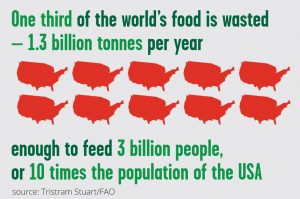As a global issue with complex causality, hunger is a challenge that shapes our collective experience. From hunger we see a ripple of social, political, economic, and environmental implications for the world and our place in it. Systemic global hunger is indicative of broken systems, human and ecological – inequality, political instability, the social cost of international trade, climate change, and food waste at every point along the commodity chain. Hunger is not simply the result of food shortage; the issue is neither apolitical nor straightforward. Thus, the systemic issue of hunger warrants a comprehensive set of interconnected solutions, developed for and executed throughout various segments of society, the economy, and the political sphere.

As a symptom of and contributing factor to hunger, systemic food waste is particularly compelling. In his TED Talk, The Global Food Waste Scandal, Tristam Stuart – a UK-based food waste campaigner, author, and speaker – illustrates how deeply pervasive food waste has become, especially in affluent countries. The global food system is bleeding food at every level, and most of this discarded food is fit for human consumption. As an example, Stuart states that at least one third of food produced on farms is thrown out for cosmetic reasons. When we waste food, we waste all of the resources used to harvest, transport, and process it. Additionally, Stuart points out that “If we do that to fruits and vegetables, you can bet we do it to animals too.” Consider then, the especially nested and exponential nature of waste as it occurs with animal products. In his essay, Global Problems and the Culture of Capitalism, Richard Robbins explains the extent to which beef production harms our planet. Robbins writes, “Half the water consumed in the United States is used to grow grain to feed cattle; the amount of water used to produce ten pounds of steak equals the household consumption [of water] of a family for an entire year.” Additionally, livestock produce copious waste and exact environmental damage in life (generate large amounts of manure, methane gas; destruction of forests for pasture lands), and in death (energy consumption and waste produced with slaughter, refrigeration, transport, etc.).
Tristam Stuart concludes his TED Talk with a single sobering truth; “At the moment we are trashing our land to grow food that no one eats.” In and of itself, curtailing food waste will not solve the issue of global hunger. However, it’s a step in the right direction, both for the issue of hunger and humanity’s toll on the environment.
Below are some tips for reducing personal food waste, from an article by Cassie Carothers for Global Citizen, “32 Tips for Reducing Food Waste Every Day”:
- Review your fridge and pantry prior to shopping.
- Plan ahead.
- Repurpose leftovers.
- Continuously monitor perishables for signs of approaching decay, mold, etc.; use these items prior to spoiling.
- Track your wasted food, to increase personal awareness and identify any preventable patterns.
Find more tips here:
Carothers, C. (2016, August 15). 32 Tips for reducing Food Waste Every Day. Global Citizen. Retrieved from: https://www.globalcitizen.org/en/content/tips-for-reducing-food-waste/

Great post, I agree that it is important to notice how much food we are wasting on an individual level. I especially liked the tip about tracking how much food you waste, because it would be helpful to me to be able to see how much food I am actually wasting rather than what I think I am wasting. But it did remind me of the Maniates article on recycling which said that the vast majority of waste comes from corporations, not from individual people. I think the same thinking can be applied to food waste. If 1/3 of the food grown on farms is tossed out for cosmetic reasons think how many people would have to waste their produce to match that statistic. I think we should start giving incentives for these farms and corporations to put the edible food waste to good use either feeding the homeless or providing a more diverse diet for livestock so that it is no longer so based on corn and soy. This could also lower the water used to feed livestock if not as much grain is being used to raise it because it was replaced by other waste products. However, this leads to the concern of what are we going to do with the excess grain. As we have seen exporting lots of cheap food to other countries has had negative effects on their economy.